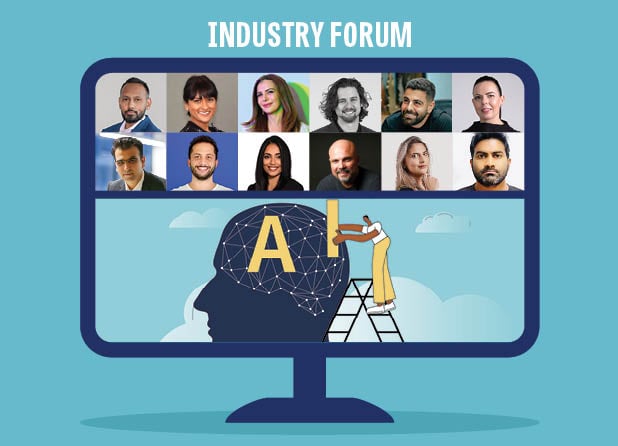
 Martino O’Brien
Martino O’Brien
Creative Director and Managing Partner, YouExperience
Yes
Brands should disclose their use of AI in social media campaigns for the sake of transparency and to build trust with consumers. By providing this information, brands empower consumers to make informed decisions about their engagement with AI-driven content. Disclosure also acknowledges the ethical implications of AI and fosters dialogue around responsible practices. Additionally, disclosing AI usage allows brands to differentiate themselves, showcase innovation, and attract tech-savvy consumers who appreciate and seek out AI-driven experiences. Overall, disclosure promotes transparency, trust, ethical considerations, and consumer appeal. This is written by ChatGPT. Guess it’s smart enough to speak for itself.
 Mareena Arif
Mareena Arif
Social Media Manager, Hashtag
Yes
Transparency and honesty are crucial in establishing trust with customers. By openly acknowledging the use of AI, brands establish credibility and honesty, enhancing their reputation. AI is still a developing technology that currently lacks clear guidelines and regulations. Therefore, it is important for brands to consider the potential risks and ethical implications that come with it. Three simple things to keep in mind are fact-checking for accuracy, monitoring for bias and staying up to date with AI-related regulations. Let’s explore the benefits of AI while adhering to the highest ethical standards in our campaigns.
 Varsha Muckatira
Varsha Muckatira
Manager – Client Experience, Weber Shandwick MENAT
Yes
The use of AI in campaigns is likely to become more prevalent and if brands are aiming to be transparent with their users and wider stakeholders about their operations – this can be highlighted as an example of how businesses can bring on board new tools and technologies to be able to better connect with target communities. This will still be conducted in tandem with the human talent driving the brand activity, therefore offering space for great studies on how developing technology can be used to elevate the creativity we see within the industry.
 Marwa Kaabour
Marwa Kaabour
Group Head of Marketing and Corporate Communication, Al Masaood
Yes
Firstly, transparency is essential to consumers, who have the right to know whether the content they engage with is created by humans or AI. Misleading audiences into believing that AI-generated content is human-created undermines trust and authenticity. Secondly, disclosing AI-generated content establishes a foundation of trust between brands and consumers. By openly acknowledging the role of AI, brands demonstrate confidence in the quality of their content and show they are not attempting to deceive their audience. This transparency fosters trust and credibility, potentially leading to increased brand loyalty.
Moreover, disclosing AI-generated content helps brands mitigate legal liability. In several markets – including this region – distributing false or misleading content is prohibited by law. Failure to disclose the use of AI could leave brands susceptible to legal consequences if their content is found to be deceptive or misleading.
Undoubtedly, GenAI is a powerful tool, but as brands, we must hold ourselves to a greater truth as expected by all stakeholders, or, to use a common comic-derived moniker “with great GenAI, comes great responsibility.” So, let’s all take this responsibility seriously.
 Leandra Meintjes
Leandra Meintjes
Chief Marketing Officer at PROVEN 360
Yes
We are witnessing a paradigm shift in social media campaigns with the use of AI, which is transforming the way brands communicate with their consumers. Companies, today, are experimenting with generative AI images and sounds, AI influencers to name some in various social platforms to reach out to their audience.
While AI can be a game changer, companies must be aware of the potential risks associated with any new technology. It is necessary that brands strike a balance between the use of technology to enhance their social campaigns and maintain the human touch that truly resonates with customers. Transparency is crucial for fostering trust and for this, brands must consider ethical and legal implications when publishing content.
Brands should definitely consider disclosing their use of AI in social media campaigns. This will demonstrate honesty, change people’s perception of technology, and show that brands are serious about promoting responsible and ethical AI implementation, which will help strengthen the credibility of the brand with their consumers.
 Shynil Hashim
Shynil Hashim
Director – Brand Services, Amber Communications
No
Advertising is content made to engage with consumers. Most of it is make-believe. Consumers know this, and brands have never disclosed the tools they use to make their content. Whether it be extensive Photoshop retouching of beauty models or fake materials to make food props, they have never bared it all to their audience. So why should they start being transparent now.
If brands do choose to be honest, they should be fully committed to it. There is no need for selective transparency. However, agencies have to be transparent to the clients about the tools (including AI) used to make content.
 Dina Salem
Dina Salem
Executive Social Media Director at TBWA\RAAD
No
It’s not mandatory, but brands can choose to disclose their use of AI. Nowadays, most target audiences can recognise when AI is employed to generate visual content. They are also aware of algorithms that analyze and learn their online behaviour for personalised experiences like online shopping and music streaming, which they can opt out of at any time. Brands and agencies use AI to enhance user experiences and support content creation. AI serves as a tool to make these processes more efficient internally. Therefore, it is up to brands whether they want to disclose their use of AI in social media campaigns.
 Yogesh Khanchandani
Yogesh Khanchandani
Co-Founder & Chief Business Strategy Officer at PivotRoots
Yes
Disclosures allow consumers to make informed decisions and better understand the nature of the content and its potential implications on engaging with it. Transparency builds trust between brands and consumers. By being open with its consumers, brands strengthen their relationships with their audience. It can also help brands create an opportunity to educate their consumers on AI and its role in their campaigns. The use of AI technologies can also have significant implications on privacy and data usage, and hence full disclosures, help brands promote accountability for their content.
Since the use of AI in communication is rapidly changing and constantly growing, its laws, guidelines, implications, and restrictions are also constantly being updated.
 Karim Mroueh
Karim Mroueh
Strategy and Innovation Lead, Serviceplan Group Middle East
Maybe
It is ultimately up to the brands whether or not they choose to reveal their use of AI on social media. What matters most is whether AI is used to improve message delivery and produce engaging content. Think of it as a chef baking a pizza in an oven. Customers may not care about the technical details of the oven, but they do care about the tasty outcome. Similarly, disclosure becomes less important as long as brands employ AI lawfully and benefit their audience. Instead of worrying about openly disclosing AI’s presence, the emphasis should continue to be on using it to improve experiences.
 Niv Bani
Niv Bani
Project Management Office Lead, Memac Ogilvy
Yes
Brands should disclose if they’re using AI in social media campaigns. This disclosure promotes transparency, a vital aspect of today’s digital landscape. By being upfront about the use of AI, brands build trust with consumers, addressing concerns over data privacy and ethical issues. Additionally, in some jurisdictions, legal requirements may mandate such transparency. Overall, while it could initially seem off-putting to some consumers, clear communication about AI use sets the stage for an open, honest relationship between brands and their audience, fostering long-term loyalty and trust.
 Marcelo Zylberberg
Marcelo Zylberberg
Associate Creative Director, Wunderman Thompson
No
Unless they see value in it. An AI tool is part of the creative process. We don’t see brands disclosing which photographers, directors, animation studios, or freelancers they worked with on their “regular” posts – except if it makes the work seem more interesting. The same goes for AI. Revealing it to followers only makes sense if it strengthens the idea and brand. Other than that, it becomes noise. Remember: people don’t want to look at a restaurant’s kitchen; they just want the food to be great.
 Alessandro Candotti
Alessandro Candotti
Social Media Director, Havas Middle East
Yes
Creating day-to-day content with AI will soon be standard, but as the real and digital worlds become increasingly indistinguishable, users will mistrust fake stories and crave real experiences on social. Especially when investing in purpose-driven, emotional content, brands need to disclose AI in a way that improves the idea, or face backlash. Knowing that AI content is inevitable, perhaps social platforms themselves will flag it if brands choose not to. Trust is already a key battleground, so leaning into transparency with AI will help legitimise brands in front of an increasingly savvy audience.
 Michael Maksoudian
Michael Maksoudian
Managing Partner, Netizency
No
Do brands disclose whether they are creating content themselves or via their agency? or whether the agency is using stock image/video, phone photography or outsourced professionals? The answer is no, as well as it is not relevant. These are all methods and tools to achieve the objective of developing a campaign. The more interesting question is ‘Should agencies disclose if they’re using AI in their work to their clients?’.
 Abner Lobo
Abner Lobo
Social Media, Digital Media, PHD MENA
Yes
When brands openly acknowledge their use of AI, they demonstrate transparency, ethical commitment, and authenticity, which ultimately strengthens our consumer relationships. This transparency eliminates misconceptions, distinguishing artistry from reality. Embracing AI’s untapped potential also fosters industry acceptance and normalises its usage, while overcoming the uncertainties that accompany AI. By doing so, brands begin to pave the way for transformative progress. This cohesive approach harnesses the power of AI, driving meaningful advancements in the industry. By embracing a transparent approach to the use of AI, we forge stronger connections, inspire innovation, and shape a future seamlessly integrating AI into creative endeavours.
 Aasim Shaik
Aasim Shaik
Managing Director, LPS
No
AI will contribute to our social media marketing mix in increasing proportions on multiple fronts – key messages, last-mile content adaptations, virtual models, intelligent targeting and many more to come. Hence, the exercise of disclose-tagging AI usage is not practical to be tracked as technology is growing exponentially and organically by the day, if not by the hour. As long as it is used to enhance the customer experience on social media, it should not be mandatory to disclose the AI hand in action. The code of social media ethics and boundaries of possibility should be measured on the same scale, whether it is a result of human efforts or
AI creation.









